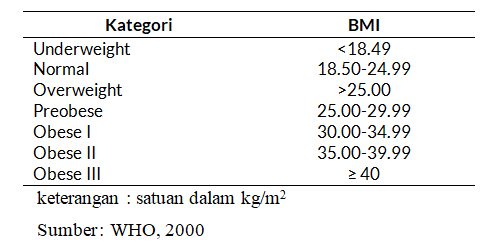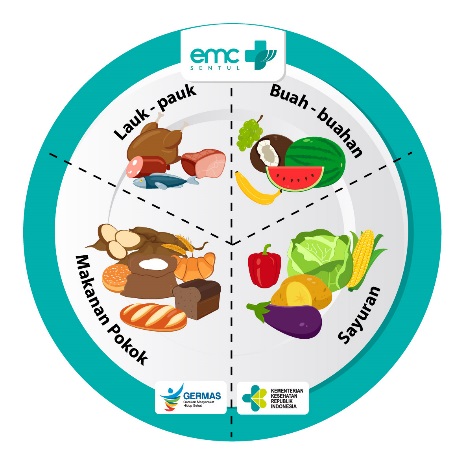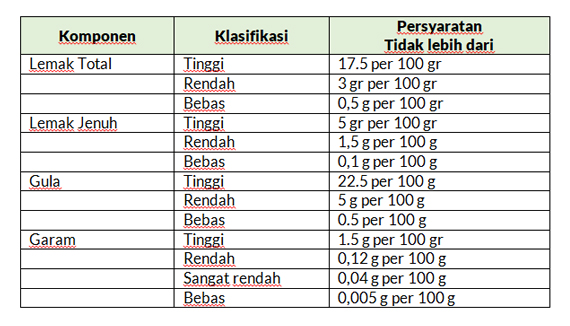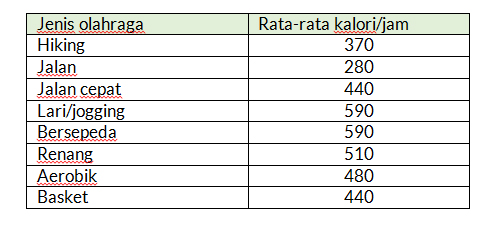
Recognize the Nutritional Status of the Millennial Generation.
The nutritional status of the millennial generation can be measured by Body Mass Index (BMI), which is the proportion of body weight to height so that it can be concluded that a person is in optimal nutritional status or not.
Body mass index table:

Example: BB = 60, TB = 150
BMI = 60/(1.5) 2 = 26.6 kg/m 2 (Overweight)
Nutrition is not optimal and Implications for health
Obesity is an implication of suboptimal nutrition due to excess nutrition and passive physical activity patterns ( sedentary lifestyle ). Excessive food intake, wrong eating behavior due to preferring fatty foods and little consumption of vegetables and fruit are the main factors of obesity. The impact of obesity is very broad on diseases that are initiated by insulin resistance such as type 2 diabetes, cardiovascular disease, cancer, and others. An increase in the prevalence of global obesity will also increase mortality and morbidity at a relatively young age (millennial generation) .

Nutritional needs for the millennial generation
Everyone has specific needs depending on their weight and activity level. However, as a general guideline, the average adult's adequacy is approximately 2,000 calories. The daily requirement can be met from 4 servings of rice, 3 servings of vegetables, 4 servings of fruit, 3 servings of tofu/tempeh, and 2 servings of fish/chicken.
The easiest way to implement a healthy diet is to visualize what's on my plate, ½ plate for vegetables and fruit, ½ plate for rice and side dishes 2 . So that in this way the millennial generation can meet the daily energy needs, and still pay attention to consumption of foods high in fat, sugar and salt.
Healthy Diet Tips
Consumption of foods with balanced nutrition as needed. Here are tips for a good diet from various sources:
- Consume high-fiber foods. Soluble fiber contained in oatmeal, bananas and apples has a function to reduce bad fats (LDL cholesterol). Water insoluble fiber such as wheat, broccoli, green beans has the function of maintaining the digestive system.
- Consumption of colorful vegetables and fruits, especially whole fruits, which contain lots of antioxidants.
- Consumption of fish 4-5 servings per week helps prevent heart disease.
- Choose low or non-fat milk, including processed products.
- Choose food sources of lean protein or nuts.
- Use an oil with medium chain triglyceride (corn oil, olive oil, coconut oil). Reduce consumption of saturated fats (high-fat milk, cream, cheese, fatty meats, coconut milk and palm oil), and very little consumption of trans fats (heated foods with margarine, pastries, fried foods).
- Limit consumption of foods high in salt (processed foods, canned foods, instant noodles), and regulate salt intake to 1-1 ½ teaspoons (< 6 grams) of salt per day.
- Reduce consumption of sugar and avoid foods high in sugar. Sugar intake per day is a maximum of 2-4 tablespoons.
Understand food labels and expiration dates
Expiry date, can identify potentially hazardous food ingredients. Food labels help the millennial generation to find out nutrients, and regulate nutrient intake according to recommendations. Therefore, the millennial generation must be wise to read food labels before buying and consuming them. Classification of nutrient content in food:

Source: BPOM, 2016
Physical Activity for optimal nutrition
Physical activity includes daily activities, transportation (eg walking or cycling), household chores, playing, games, sports or planned exercises, in the context of daily activities, family and society. To maintain a healthy body, the millennial generation must increasing physical activity by exercising regularly 150 minutes/week 2,3,4,5 and avoiding a passive " sedentary life style" lifestyle by increasing daily physical activity.
Estimated calories/hour burned:

*Based on weight = 70 kg, calories burned can be higher for people with weight> 70 kg, and lower for people with weight <70 kg. Source: CDC, 2012.
We can achieve optimal nutrition with 3 (three) things, namely a balanced diet, increasing physical activity, and weight management. Let's achieve optimal nutrition to maintain the health of the millennial generation.
Author : Yeni Rohmaeni, S. Gz (EMC Sentul Hospital Dietitian)
Bibliography :
- Masrul, 2018. The obesity epidemic and its impact on public health status and the nation's socio-economic status. Andalas Medical Magazine Vol. 41, No. 3, September 2018, Pg. 152-162.
- Ministry of Health, 2014. Guidelines for Balanced Nutrition.
- USDA, 2015. Dietary Guidelines For Americans 2015-2020 8 yr
- CDC, 2012. Can Lifestyle Modifications Using Therapeutic Lifestyle Changes (TLC) Reduce Weight and the Risk for Chronic Disease? Can Lifestyle Modifications Using Therapeutic Lifestyle Changes (TLC) Reduce Weight and the Risk for Chronic Disease?. Research to Practice Series, No. 7.
- FSSAI India, 2017. Report of the expert group on consumption of fat, sugar and salt & its Health Effect on Indian Population.
- BPOM, 2018. Regulation of the Head of the Drug and Food Supervisory Agency of the Republic of Indonesia Number 13 of 2016 concerning Supervision of Claims on Processed Food Labels and Advertisements.
- 2000. Obesity: Preventing And Managing The Global Epidemic . WHO Technical Series 894. Geneva. 2000.
